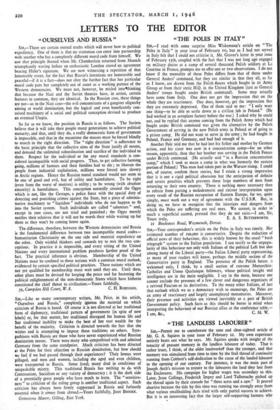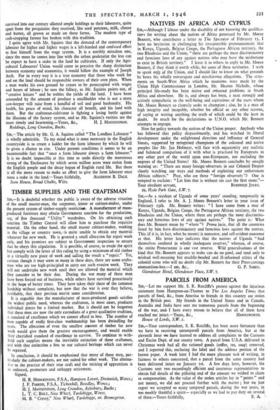"THE LANDLESS LABOURER"
StR,—Permit me to corroborate the sane and clear-sighted article of Mr. G. A. Squires in your issue of February 22. My own experience entirely bears out what he says. Mr. Squires speaks with insight of the tenacity of peasant memory in the landless labourer of today. That is rather truer, I think, of the older landworke than the younger, and that memory was stimulated from time to time by the frail thread of continuity running from Cobbett's self-dedication to the cause of the landed labourer to the opening of our century. For instance, it was the main part of Joseph Arch's mission to restore to the labourers the land they lost from the Enclosures. His campaign for higher wages was secondary to this. Later, Jesse Collings, Frederick Impey and Lord Tollemache picked up the thread again by their crusade for "three acres and a cow." It proved abortive because the tide by this time was running too strongly away from what various smallholding Acts tried with only partial success to achieve. But it is an interesting fact that the larger self-supporting farmers who
survived into our century allotted ample holdings to their labourers, quite apart from the perquisites they received, like seed potatoes, milk, cheese and butter, all grown or made on these farms. The modem type of cash-cropping farmer has broken with this tradition.
I quite agree with Mr. Squires that the demand of the contemporary labourer for higher and higher wages is a left-handed and confused effort to free himself from the wage system. It is a terribly mistaken one, since the more he comes into line with the urban proletariat the less can he expect to have a stake in the land he cultivates. If only the Agri- cultural Labourers' Union would come to perceive the sharp distinction between economy and economics, it would follow the example of Joseph Arch. For in every way it is a true economy that those who work for and on the land should be responsible owners of their own plots. When a man works his own ground he ceases to be preoccupied with wages and hours of labour ; he sees the fallacy, as Mr. Squires points out, of "creative leisure" and he trebles the yields of the land. I have been astounded by the amount of produce a smallholder who is not a mere cow-keeper will raise from a handful of soil and good husbandry. His health, his peace of mind, his character all benefit, and his land with them. But the craftsman-cultivator is fighting a losing battle against the illusions of the factory system, and so Mr. Squires's verities are the more timely and heartening.—Yours, &c., H. J. MASSINGHAM. Reddings, Long Crendon, Bucks.



























 Previous page
Previous page